 Petzlover
Petzlover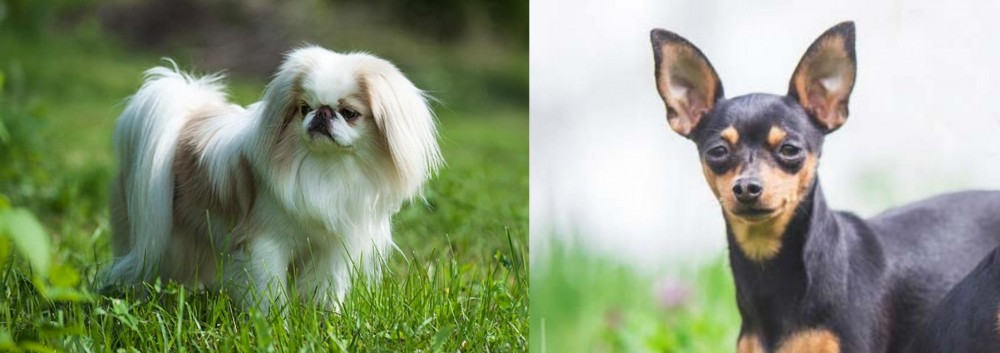 Japanese Chin is originated from Japan but Prazsky Krysarik is originated from Czech Republic. Both Japanese Chin and Prazsky Krysarik are having almost same height. Both Japanese Chin and Prazsky Krysarik are having almost same weight. Both Japanese Chin and Prazsky Krysarik has same life span. Both Japanese Chin and Prazsky Krysarik has almost same litter size. Japanese Chin requires Moderate Maintenance. But Prazsky Krysarik requires Low Maintenance
Japanese Chin is originated from Japan but Prazsky Krysarik is originated from Czech Republic. Both Japanese Chin and Prazsky Krysarik are having almost same height. Both Japanese Chin and Prazsky Krysarik are having almost same weight. Both Japanese Chin and Prazsky Krysarik has same life span. Both Japanese Chin and Prazsky Krysarik has almost same litter size. Japanese Chin requires Moderate Maintenance. But Prazsky Krysarik requires Low Maintenance
 The Japanese Chin, also known as the Japanese Spaniel, has always been known for thousands of years as a dog with strong companion characteristics.
The Japanese Chin, also known as the Japanese Spaniel, has always been known for thousands of years as a dog with strong companion characteristics.
Hailing from Asia, he is also known as the Japanese Spaniel. In Japan, the Chin dogs are royalty and lapdogs, and while the exact origin of the Japanese Chin isn't quite clear, it is an ancient toy breed.
The first Japanese Chin was brought to America in 1882. The toy breed was recognized by the American Kennel Club in 1888, as a Japanese Spaniel. The AKC changed the breed name to the Japanese Chin in 1977.
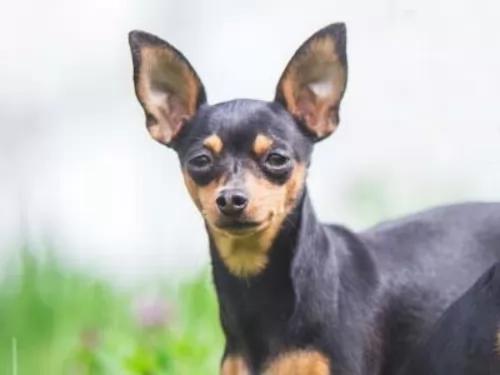 You won’t find this dog outside the Czech Republic, which is a pity, because as one of the smallest breeds, it’s a great choice for people with small properties.
You won’t find this dog outside the Czech Republic, which is a pity, because as one of the smallest breeds, it’s a great choice for people with small properties.
It’s not a new breed, and there are records of it having been around in the Middle Ages, being valuable for catching rats.
The breed went through a decline in the 1980s, but their breeding program was started, although it isn’t an FCI acknowledged breed.
 As a small sized dog, the oriental looking Japanese Chin stands at about 20 to 27cm in height and weighs roughly 2 to 6kg. He has a large round head with big brown eyes and a short muzzle. The ears are long and feathery and the tail is long and held up over the back.
As a small sized dog, the oriental looking Japanese Chin stands at about 20 to 27cm in height and weighs roughly 2 to 6kg. He has a large round head with big brown eyes and a short muzzle. The ears are long and feathery and the tail is long and held up over the back.
The long silky single coat is either white and red or white and black or it can be tri-colored too – white, black and reddish-tan.
The Japanese Chin is a small, evenly tempered dog and the toy-size dog, according to people who have owned him as a pet, say he has some cat-like features – the ability to leap and the ability to wash himself similar to what a cat does.
He is also a typical lap dog liking nothing more than to lie in your lap and be petted. He just loves being with his human family and his smallness allows him to fit well into city- or country life.
He is an intelligent dog. He is small but strong-willed and that is why both you and him will benefit from having him trained and socialized as he becomes more amicable and obedient.
Social, jaunty and content, he is everyone’s friend and will be a suitable playmate for children, being loving and devoted to his entire family. They make great therapy dogs as he has the knack of being sensitive to the feelings of people and adjusts his mannerisms to suit the people he is with.
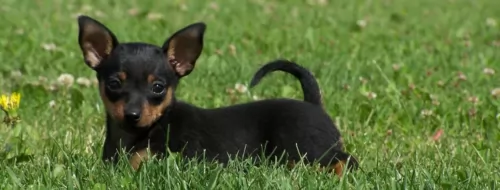 The Pražský Krysařík is a small dog standing at between 20 and 23cm in height and weighing between 1.5 and 4kg.
The Pražský Krysařík is a small dog standing at between 20 and 23cm in height and weighing between 1.5 and 4kg.
The Prazsky Krysarik may be small, but he is robust with a broad chest and a lean body with a fragile, lizard like head, much like a Chihuahua. The legs are fragile and thin. The ears are fairly large and erect and he has a long tail. The coat is short, thin and glossy and is mostly black and tan.
The Prazsky is known for its playful, lively nature, and they’re spunky and intelligent dogs too and will be more than capable of being trained and socialized.
Even though he is such a tiny dog, it will be to his benefit to have him trained and socialized.It makes the dog well balanced and they become well behaved so you can take them anywhere.
They are such friendly, social little dogs too and they love being around their human family. They certainly don’t like being left in the backyard, cut off from their human companions.
They're small enough to be indoors a lot, being able to easily slot into life in the city or in the countryside. They get on well with children and other pets but kids will have to be taught how to treat him with kindness and respect, as those tiny little legs could snap.
 The Japanese Chin is just longing to be your special friend. When you treat him with the love and care he deserves, you'll discover that he is a sweet, gentle companion who will be loyal and loving to his human family.
The Japanese Chin is just longing to be your special friend. When you treat him with the love and care he deserves, you'll discover that he is a sweet, gentle companion who will be loyal and loving to his human family.
He is a quiet pet and intelligent enough to be trained and socialized so that he is obedient and ready to please. Although he doesn't bark much, he makes quite a few other noises such as wheezing, snorting and snorting. He makes up for it by being entertaining and loving towards you so that you life is brighter just by having him in it.
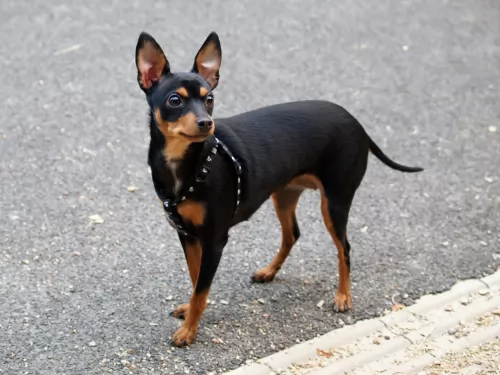 A Prazsky is a dog just like any other – he just wants to be a member of the family. He badly wants the love and attention of his human family but he wants to give love and attention in return too.
A Prazsky is a dog just like any other – he just wants to be a member of the family. He badly wants the love and attention of his human family but he wants to give love and attention in return too.
They make wonderful pets and he is more than willing to put aside playing outdoors to come inside and just be by your side.
These little dogs are a great choice for those looking for a small-sized dog. They’re such friendly, responsive little dogs and they don’t come with many health-related issues. The Prague Ratter adapts well to city or country living and he is prepared to be loyal and loving wherever you take him.
 There are a few health issues with your Japanese Chin that are worth knowing about such as hypoglycemia, cataracts and heart murmurs. Allergies and dental issues also need to be checked.
There are a few health issues with your Japanese Chin that are worth knowing about such as hypoglycemia, cataracts and heart murmurs. Allergies and dental issues also need to be checked.
Dog breeds with the flattened face always battle with dental-, eye and breathing problems. With good care however, your Japanese Chin can reach anything from 10 – 12 years of age.
Murmurs come about because of a disturbance in the blood flow and which can produce an audible noise. If your dog's murmur is associated with structural heart disease, your dog may display signs of congestive heart failure and he'll be weak for instance and be coughing.
When your dog gets to the vet, the course of treatment will be determined on the type of heart murmur. Luckily puppies with low grade murmurs often grow out of it but if you have an adult dog, routine diagnostic imaging may be recommended by your vet.
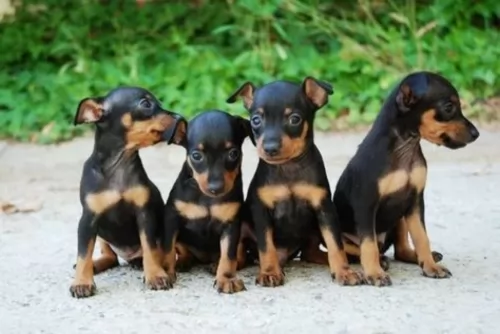 The Prazsky is a robust dog but there are some diseases that can affect a dog, and skin symptoms such as itchiness or an unusual lump will need to be seen to.
The Prazsky is a robust dog but there are some diseases that can affect a dog, and skin symptoms such as itchiness or an unusual lump will need to be seen to.
Other problems such as excessive drooling, cloudy eyes with discharge, distended abdomen and discolored gums are all reasons to seek the help of your vet. Small dogs like this tend to be prone to dental disease, so keep an eye on his teeth.
Some people look at buying health insurance because they know too well that veterinary costs can add up quickly, even for a tiny little dog like this.
 The Japanese Chin has a single coat, and a brush once or twice a week will keep the coat silky and untangled.
The Japanese Chin has a single coat, and a brush once or twice a week will keep the coat silky and untangled.
Check his ears for dirt and wax and try to wipe inside the ears, being very, very careful not to go deep into the ear to avoid damage.
Clip his nails and brush his teeth as small dogs are more prone to dental disease. Periodontal disease is preventable with dental cleaning. Dental disease starts when plaque sticks to the surface of the teeth. It hardens, spreads under the gum line and cause tissue damage. It also damages the immune system.
The Japanese Chin is an energetic dog and loves a game and a walk. It isn't the kind of dog that you will take on your hikes or swimming as it tends to huff and puff after a while from too much exercise, and more specifically in hot weather.
Dog experts say that a grain-free food is best for this kind of dog. Kibble which comes with lean protein and with plenty of vitamins and minerals such as taurine and carnitine is recommended. They are good for the joints, coat, heart and eyes. Japanese Chins can be prone to heart- and eye problems and kibble rich in omega 3 fatty acids will be good for the Chin for many excellent reasons.
If you're in any way uncertain about what to feed your Japanese Chin, speak to your vet as the type of food you feed your pet will determine how healthy he will be. Always ensure he has access to fresh, cool water.
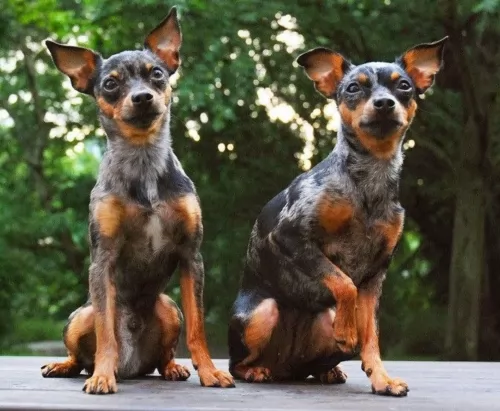 It doesn’t matter what size dog you have, each one requires high quality dog food, whether commercially manufactured or home-prepared.
It doesn’t matter what size dog you have, each one requires high quality dog food, whether commercially manufactured or home-prepared.
Portion sizes should be appropriate to your dog’s size and activity levels. Dogs thrive on simplicity when it comes to food as this prevents them having digestive problems. Boiled chicken, brown rice or pasta and sweet potatoes, spinach and carrots all chopped up and added to your dog’ dry kibble as a treat every now and again will do wonders for your pet.
Fresh, cool water should always be available to your pet around the clock.
The short, smooth coat of the Pražský Krysařík makes him a truly low maintenance little dog. Just give him a brush twice a week and wipe him down with a damp cloth and he’ll always be gleaming like a new penny.
Have his nails trimmed and always check his teeth during these grooming sessions. Smalls dogs battle with dental disease, and this can cause havoc in the body of your small pet.
Walk your tiny pet at least once a day. It just gives him the chance to sniff around a bit and see the world in a new light. He doesn’t require a lot of physical activity, but they will still need regular exercise to stave off obesity.
Get your Pražský Krysařík spayed or neutered if you’re not intending to allow your pet to have puppies. These little dogs can have between 1 – 3 puppies. There are many pros to this procedure for dogs.
Make sure his vaccinations are up to date to avoid some of the deadly dog diseases you get such as parvo-virus, distemper and rabies.